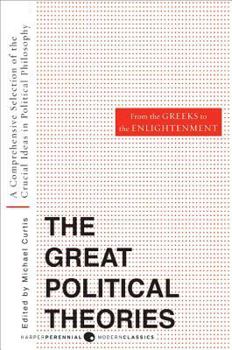Great Political Theories, Volume 1: A Comprehensive Selection of the Crucial Ideas in Political Philosophy from the Greeks to the Enlightenment
Select Format
Select Condition 
Book Overview
As an introduction to political theory and science, this collection of writings by the great philosophers will be of close interest to general readers. It also serves as a basic textbook for students of government and political theory. Such fundamental concepts as Democracy, the Rule of Law, Justice, Natural Rights, Sovereignty, Citizenship, Power, the State, Revolution, Liberty, Reason, Materialism, Toleration, and the Separation of Church and State are traced from their origins, through their development and changing patterns, to show how they guide political thinking and institutions today.
Format:Paperback
Language:English
ISBN:0061351369
ISBN13:9780061351365
Release Date:March 2008
Publisher:Harper Perennial
Length:464 Pages
Weight:0.82 lbs.
Dimensions:1.1" x 5.4" x 8.0"
Customer Reviews
3 ratings
A Great Overview
Published by Thriftbooks.com User , 17 years ago
I highly recommend this volume for its breadth of coverage as an intro or a refresher. It enables the reader to get many of th ebasisc to use as a springboard to a further analysis of the philospohers one desires to read in greater detail. I am now reading Vol. 2.
Excellent survey of western political thought
Published by Thriftbooks.com User , 19 years ago
In the introduction, Curtis writes this as the essence of the subject of these books: "The core of political philosophy has always been the study of those central institutions, organizations and personnel that have the power to issue directions and rules, and the relationship of the governed to government. The recurring problems of political philosophy are those concerning the nature of society, law, obligation, rights, duties, command, responsiblity and obedience. In modern theory, there has been a preoccupation with sovereignty, power, influence, and groups." Over the course of both volumes, Curtis presents a methodical layout of these issues, starting with the ancient Greeks to modern times, and it lives up to the aspirations stated up front. The ebb and flow of the often multiple jurisdictions and centers of power within a state often bring about the same questions in different eras. What rights do an individual have against the power of the state, and from where does this power derive? A related question to this necessarily involves what the proper role a citizen or group has within the government, whether they should be identified solely as one of the whole, or whether they are members of a higher order, or whether their primary identity should be derived as biological and rational animals under the laws of nature. As evidence that this is concerned only with theory and not history (where some leaders may have corrupted the theory), Marxism and nationalism, two of the most often-arising philsophies of the 20th century, are only given brief treatment, and even then, only on its merits as a theory, not practice. The publishing date of the book may require some revisions of the organization of the later chapters, but for a brief two-volume collection of the writings on political philsophy, this book is a good buy.
Just Right!
Published by Thriftbooks.com User , 25 years ago
I think that this book is prefaced well and in those terms serves the reader to the full extent promised. The book basically gives an over view of early political theory through excerpts from excellent selected texts. It is a fair cross-section of political treatises providing it fits into one book that is for the novice. I would highly recommend this book to anyone.






